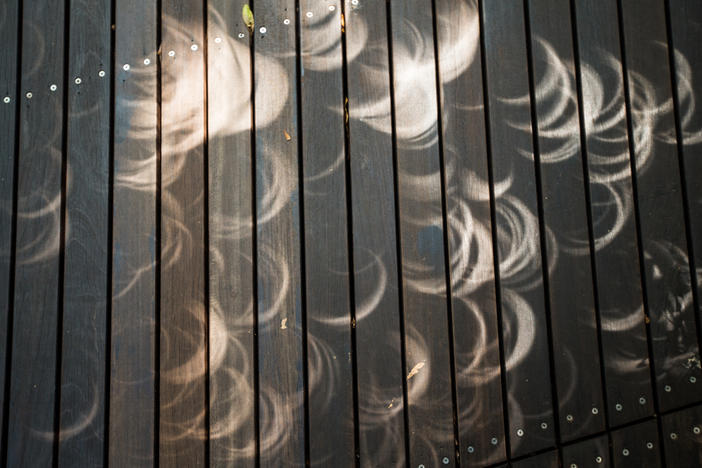Section Branding
Header Content
Up First briefing: Gaza's humanitarian crisis; Scalise gets House speaker nomination
Primary Content
Good morning. You're reading the Up First newsletter. Subscribe here to get it delivered to your inbox, and listen to the Up First podcast for all the news you need to start your day.
Today's top stories
Gaza is in a humanitarian crisis, days into the war between Israel and Hamas. Power is out, and the enclave is completely under siege — cut off from food, fuel, water and electricity. The conflict has claimed a total of at least 2,500 Palestinian and Israeli lives. The crossing into Egypt has been hit at least three times. Morning Edition host Leila Fadel is in Jerusalem, where she's been calling people in Gaza overnight.
- Fadel shares a conversation with NPR producer and Gaza resident Anas Baba on Up First. He says he left his job to evacuate his family but couldn't find safety. "Where am I going to take them?" he says. "Where am I going to hide them?" Palestinians are worried they'll be cut off from the world. One journalist tells Fadel, "Don't forget us. We are innocent people."
- Wafaa Abuzayda was visiting her family in Gaza when the war broke out. She's among hundreds of trapped Palestinian Americans. She says the hardest feeling is hiding her fear from her 1-year-old son, who doesn't understand what's happening. When asked to give a message to the U.S. government, she simply pleaded, "Please save us."
- In Israel, some of the worst violence from Hamas took place in small communal towns called kibbutzim. They're uniquely Israeli and have a significant legacy there. Read about their history and what life is like now.
- Secretary of State Antony Blinken is in Tel Aviv. NPR's Michele Kelemen traveled with him. On Morning Edition, she says U.S. diplomacy is focused on supporting Israel, keeping the situation contained and preventing involvement from others in the region.
- In the U.S., President Biden assured leaders of American Jewish groups that he's taken steps to boost security measures for Jewish communities.
- This news has been devastating to process — especially for children. Here's advice on how to talk to kids about what's happening.
House Republicans nominated Louisiana Rep. Steve Scalise to serve as the next House speaker yesterday. But he doesn't have enough votes to be elected by the full House.
- Rep. Jim Jordan lost the nomination and quickly supported Scalise. But NPR's Deirdre Walsh says some of Jordan's supporters aren't budging. Republicans are worried they look unable to govern amid the violence in Israel and Gaza and a looming government shutdown.
Sam Bankman-Fried's ex-girlfriend Caroline Ellison has finished her testimony in his fraud trial. She painted Bankman-Fried as the mastermind behind an effort to steal billions from customers, investors and lenders. Here are five takeaways from her testimony — and why it matters.
Picture show
The London Museum of History has announced this year's Wildlife Photographer of the Year winners. Judges looked at more than 40,000 entries from nearly 100 countries. Take a look at the photos. They'll take you underwater, into the woods and high above cities — and showcase the precarity of life on Earth.
Deep dive
The next time you need self-care, consider swapping your sheet mask for a plunge in icy cold water. All over the world, people are seeking the transformative effects of a dip in a frigid lake, ocean or ice bath. But are the health benefits just hype? Researchers separate fact from fiction for NPR:
- Acute, repeated cold exposure can help with blood sugar — but you need to shiver to get the most benefit.
- Cold exposure may release anti-inflammatory markers in the body. It's unclear if this helps with long-term, chronic inflammation.
- Research on the cold's effects on anxiety and depression shows great promise. Stress from a cold plunge can help you adapt to other stressful situations
Ready to try cold plunging? Take researcher François Haman's advice: not that long, not that often and not that cold.
3 things to know before you go
- NASA has analyzed the first bits of the asteroid sample brought back to Earth last month. The black rocks and dust were carbon- and water-rich.
- California is now the first state to create an "Ebony Alert" system for finding missing Black women and children. They go missing at a disproportionate rate in the U.S. but rarely make national headlines.
- The Biden administration wants to ban "junk fees" — the hidden fees added to everything from short-term rentals to food delivery — that cost consumers an estimated $64 billion yearly.
This newsletter was edited by Majd Al-Waheidi.
Copyright 2023 NPR. To see more, visit https://www.npr.org.
Bottom Content







